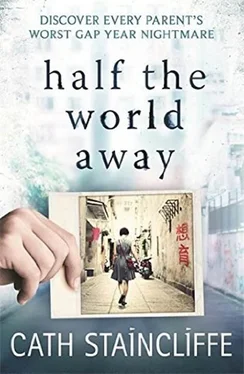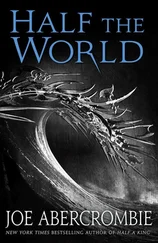* * *
Lori is awake more as the dosage of the sedative is slowly reduced. They alter the position of the bed, raising her head so she is sitting up. And on the fourth day they remove the gastric feeding tube and the nurse tells us they plan to sit her on the edge of the bed for ten minutes at a time. Because of the extreme muscle wastage, such small steps are milestones. She is weak as a kitten.
Each time I see her, it cuts me to the quick: her skeletal frame, the ghastly, savage sores and, most of all, her frailty. But I must hide my pity and sorrow, and adopt the same positive, practical tone that all the medical staff have. She is getting better, I tell myself. She is getting better every day.
‘How did you find me?’ Lori says, her voice hoarse. The first direct question she has asked.
My mouth goes dry and I stumble over the first few words. ‘Mrs Tang told us you were going to photograph Bradley but he said you’d not fixed anything up. We were suspicious. Your dad found messages from you on Bradley’s phone and we managed to get into his flat when he went to work. That’s where we found your camera. When it seemed like the police weren’t doing very much we followed the pictures.’
I have to tell her the rest. I don’t want her hearing it from anyone else. ‘Lori – Bradley hurt someone else as well.’
Tremors flicker near her mouth. ‘Who?’ she croaks.
‘A Chinese woman.’ How do I say it? He killed her? He kept her skeleton in a suitcase? ‘She died,’ I say.
Lori stares, makes a choking noise. ‘Who was she?’
‘We don’t know. The police are trying to find out.’
Tears spring to her eyes. She shuts them. ‘Don’t go,’ she says.
‘I’ll be here.’ She reaches for my hand, hers blackened by the bruising from the cannula. Her skin is hot. It is the first time she has let me touch her properly. I am light-headed. When her grip loosens I keep holding on as long as I can until cramp burns along my forearm and my fingers tingle with pins and needles.
The nurses get Lori to sit in the chair at the bedside. She has very little to say. Her only request, ‘I want to go home.’
‘You will,’ I tell her, ‘as soon as you can walk a little.’
She is stooped, frail, her eyes huge and wary. Now able to feed herself, she has little appetite and her diet is supplemented with nutritional drinks.
Her hair is dull and ragged, the sores either side of her mouth are two large dark circles, and with her chapped lips joining them she looks like a macabre clown.
But the arrhythmia has cleared up and the inflammation in her lungs has nearly gone. I’m astonished at the sweep of her recovery, at the work they have done here in the hospital, at her body’s capacity to heal.
Her friends are allowed to visit now, two at a time, for short periods. Dawn and Rosemary, then Shona and Oliver. Oliver brings some food his mother has made, little parcels of rice and meat. Lori can’t eat it but we thank him all the same.
By Thursday she can take several steps unaided and is transferred to a medical ward. She has a room on her own but the staff recommend she is not left alone so Tom and I sit with her in turn.
‘We can arrange for someone from the psychiatric service to speak to you,’ the doctor tells Lori, ‘about your experience.’
‘No,’ Lori says.
‘You can consider this when you are back in the UK.’
Lori gives a nod, her eyes averted, noncommittal. She is still awkward when we touch her, recoiling or stiffening at a hand on her arm, or the prospect of a hug.
Is it a barrier we need to break through? If we kept touching her, kept our hands on her, while we sit, might we be able to override the fear she has? It’s not something I dare try. We have to respect her boundaries. She was always so at ease physically, comfortable in her own skin, generous with hugs and kisses. Has that gone for ever?
The day before we travel home, Peter Dunne meets us at the hotel, bringing Lori’s emergency passport and our new tickets. We have a suite, two bedrooms, two baths and a living room. We sit in the living room on the couches with their shot-silk mustard covers, the floor-length drapes drawn back to reveal the vista of the river snaking through the city, olive green today under a clear sky. Tom is still packing but I am nearly done.
Peter Dunne asks after Lori.
‘She’s gaining weight,’ I say, ‘and she can walk a little further every day but we will use a wheelchair for the airport.’
‘That’s good to hear.’ He pauses, then, ‘I have some news from the PSB.’
Tom stops moving, a pile of clothes in his arms.
‘We’re seeing them today,’ I say, ‘for Lori’s statement.’
‘They have identified the other woman,’ Peter Dunne says.
Oh, God. A chill settles on me. Tom glances my way, eyes alert.
‘Apparently she was a Chinese student, nineteen years old, from Chengdu, studying in Chongqing. She went missing at the end of September, on her way home for National Day.’
Eight months ago. ‘What’s her name?’ I ask.
‘Bai Lijuan.’
I remember what Anthony said, how hard it was to publicize cases of missing Chinese girls.
‘Do they know how she met him?’ Tom says.
‘No.’ Peter Dunne adjusts his glasses. I sense he has more to say. He draws in a quick breath. ‘You saw oil drums in the workshop?’
‘Yes,’ Tom says.
‘The police also found substantial quantities of lye, caustic soda. It’s a very powerful alkaline.’
‘Jesus.’ I see what he is saying. I remember the drain where Lori was tied up, and how the bones we found were so clean.
Tom groans.
‘Her parents?’ I say.
‘They’ve been notified.’
‘Has he confessed?’ Tom says.
‘No.’
Bradley Carlson has been in custody for a week. He can be held for up to thirty.
I think of Lijuan’s parents, how they must have waited like us, anxious, then increasingly desperate. Weeks stretching into months.
‘Can we… I don’t know… send our condolences or something?’ I say.
‘If you wish to write a note I can get it translated and make sure it reaches them.’
I find hotel stationery. ‘Is it Mr and Mrs Bai?’ I ask Peter Dunne.
‘Mr Bai and Mrs Wen,’ he says. ‘Chinese women keep their maiden names when they marry.’
I write:
Dear Mr Bai and Mrs Wen,
We are so sorry for the tragic loss of your precious daughter Bai Lijuan and our thoughts are with you now. We hope that your loving memories of her will sustain you at this difficult time and be something to cherish for ever more.
I sign it from Tom, Lori and me, and give it to Peter Dunne.
There are a few moments’ silence, then Peter Dunne says, ‘Your car’s booked for the morning. Is there anything else you need?’
‘No. Thanks,’ Tom says.
I check the time. We need to leave soon: we are meeting the police in a room at the hospital, then packing Lori’s things at the apartment. Lori wants to see it again. Her friends have volunteered to help and I don’t know if that’s wise. Lori is traumatized – how could she be otherwise – and I worry that this will overwhelm her, but she says she’s OK with it. I have to trust her to tell us what she can and can’t cope with.
Lori has asked me to sit in with her for the police interview. Three police officers come: Superintendent Yin, Detective Song and Detective Lee. Detective Lee, a woman, speaks good English. She writes down what Lori says and translates it into Chinese for the men as she does so. Her manner is kind, measured and sympathetic.
Lori answers a few questions about Bradley, how long they’d known each other, how often they saw each other, the nature of their relationship, then Detective Lee asks her to describe the events of Monday, 7 April.
Читать дальше












